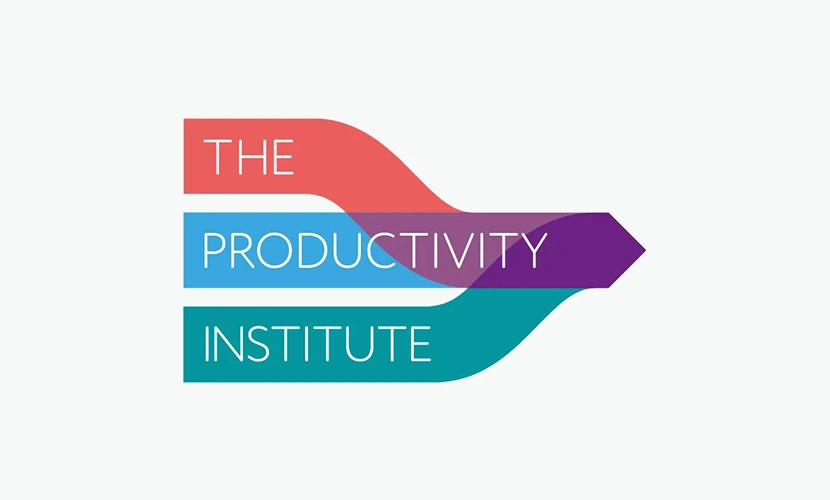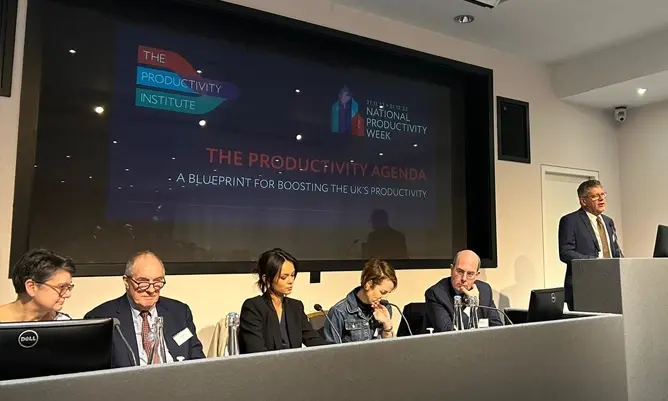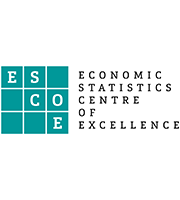The Productivity Institute
The Productivity Institute, funded by the Economic and Social Research Council (ESRC), brings together world-leading experts from a range of disciplines and backgrounds, working directly with policymakers and businesses to better understand, measure, and enable improvements in productivity across the whole of the UK, with the aim to improve living standard and well-being.
The Institute will support a step-change in the quality and quantity of research available in the UK that will directly inform government policies and business strategies to improve productivity.
Productivity themes
We are building our work through eight main themes:
Geography & Place
The low productivity levels of some regions or areas of the UK, and the consequent disparities in income and broader well-being, are widely documented. We research how the differences between leading and lagging places have evolved and what are the feedback mechanisms embedding them, while we also look at how these relate to the provision of public services, health and educational outcomes. Our research investigates the reasons for the mixed performance of these interventions, comparing them with international practices.
Recommended reading:
- Forth, T and Jones, R. 2020. The Missing £4bn: Making R&D work for the whole UK. Nesta.
- Billing, C; McCann, P; and Ortega-Argilés, R. 2019. Interregional inequalities and UK sub-national governance responses to Brexit. Regional Studies, 1-20.
| Name | Organisation | Division or Department |
|---|---|---|
|
Professor Philip McCann (Theme leader) |
University of Sheffield |
Management School |
|
Professor Tim Vorley |
Oxford Brookes University |
Oxford Brookes Business School |
| Professor Anthony Venables | University of Oxford | Economics |
|
Professor Anthony Rafferty |
The University of Manchester |
Alliance Manchester Business School |
|
Ms Ana Rincon Aznar |
National Institute of Economic & Soc Res |
National Institute of Economic & Soc Res |
|
Dr David Nguyen |
National Institute of Economic & Soc Res |
National Institute of Economic & Soc Res |
Social, Environmental & Technological Transitions
Coming decades will see major transitions as the UK adopts new technologies and responds to climate change. These transitions will require transformative change in (digital and low-carbon) technologies, business models, skills needs, infrastructure, policies and markets (Geels, 2019). What are the future productivity opportunities from digital technology and green growth and how can investments and skills be shaped to make the most of the complementarities between them (Acquier et al., 2017)? And what are the main distributional impacts on productivity across regions, sectors, and firms, and how can those be managed?
Recommended reading:
- Geels, F.W., 2019, Socio-technical transitions to sustainability: A review of criticisms and elaborations of the Multi-Level Perspective, Current Opinion in Environmental Sustainability, 39, 187-201.
- Acquier, A., Daudigeos, T., Pinkse. J., 2017, Promises and paradoxes of the sharing economy: An organizing framework, Technological Forecasting and Social Change, 125, 1-10
| Name | Organisation | Division or Department |
|---|---|---|
|
Professor Frank Geels (Theme leader) |
The University of Manchester |
Alliance Manchester Business School |
|
Professor Jonatan Pinkse |
The University of Manchester |
Alliance Manchester Business School |
|
Professor Bridgette Wessels |
University of Glasgow |
School of Social & Political Sciences |
| Professor Bart van Ark | The University of Manchester |
Alliance Manchester Business School |
Human Capital
While there is a vast amount of human capital research on the value of qualifications, we know far less about which skills and abilities - particularly psychological and social - are important for productivity and wellbeing, and how and where they can best be developed and deployed in a rapidly-changing digital economy. Our research will explore these issues in depth.
Recommended reading:
- Rafferty, A 2019, 'Skill underutilization and under-skilling in Europe: The role of workplace discrimination', Work, Employment & Society, vol. 26, no. 6.
- Oswald, A.J., Proto, E. and Sgroi, D., 2015. Happiness and productivity. Journal of Labor Economics, 33(4), pp.789-822.
- Rani, U. and Grimshaw, D., 2019. Introduction: What does the future promise for work,
employment and society? International Labour Review, 158(4), pp.577-592. - Britton, J., Shephard, N. and Vignoles, A., 2019. A comparison of sample survey measures of earnings of English graduates with administrative data. Journal of the Royal Statistical Society: Series A (Statistics in Society), 182(3), pp.719-754.
| Name | Organisation | Division or Department |
|---|---|---|
|
Damian Grimshaw (Theme leader) |
King's College London |
School of Management and Business |
|
Dr Simone Schnall |
University of Cambridge |
Psychology |
|
Dr August De Coulon |
King's College London |
School of Management and Business |
|
Professor Mary O'Mahony |
King's College London |
School of Management and Business |
|
Professor Eugenio Proto |
University of Glasgow |
Adam Smith Research Foundation |
|
Jill Rubery |
The University of Manchester |
Alliance Manchester Business School |
Organisational Capital
Stagnant long-term productivity growth in UK firms has been linked - alongside other factors - to failures in technology diffusion, low levels of investment, short-termism, an inclination towards more incremental innovation and a general decline in business dynamism. Brexit and the impact of Covid-19 on the survival and strength of UK businesses may undermine investment, innovation and future productivity growth. Longer-term, UK businesses face other challenges – e.g. digitisation and the transition towards net zero – which may either exacerbate or help address the productivity challenge. Our research will examine how COVID-19 is impacting on firms across the productivity distribution, explore how firms are tackling the digital and net zero transitions, and how they can be incentivised to upgrade productivity.
Recommended reading:
- Driffield, Nigel L. and Karoglou, Michail (2019) Brexit and foreign investment in the UK. Journal of the Royal Statistical Society: Series A (Statistics in Society) , 182 (2). pp. 559-582. doi:10.1111/rssa.12417
- Roper, S (2020) R&D and innovation after Covid-19: What can we expect? A review of trends after the financial crisis, Enterprise Research Centre, May 2020.
- Vanino, Enrico, Roper, Stephen and Becker, Bettina (2019) Knowledge to money : assessing the business performance effects of publicly-funded R&D grants. Research Policy, 48 (7). pp. 1714-1737. doi:10.1016/j.respol.2019.04.001
| Name | Organisation | Division or Department |
|---|---|---|
|
Professor Nigel Driffield (Theme leader) |
University of Warwick |
Warwick Business School |
|
Dr Irina Surdu |
University of Warwick |
Warwick Business School |
|
Professor Stephen Roper |
University of Warwick |
Warwick Business School |
|
Professor Christopher Warhurst |
University of Warwick |
Institute for Employment Research |
|
Dr Elvira Uyarra |
The University of Manchester |
Alliance Manchester Business School |
|
Professor Janet Godsell |
University of Warwick |
WMG |
| Professor Mark Hart | Aston University |
Knowledge Capital
There are large gaps in the understanding and measurement of knowledge capital. Our research explores the definition, measurement, and valuation of components of knowledge capital, as well as the interactions between intangible assets and organisational, human and social capital. What is the role of the state and universities in innovation? And how is innovation affected by market structure and participation in global supply chains?
Recommended reading:
- IBM iX and University of Cambridge. 2020. Targeting the Full Value of Digital Disruption.
- Velu, C. 2018. Solving the Productivity Paradox. Manufacturing Leadership Journal.
| Name | Organisation | Division or Department |
|---|---|---|
|
Professor Diane Coyle (Theme leader) |
University of Cambridge |
Politics and International Studies |
|
Professor Vasco Carvalho |
University of Cambridge |
Economics |
|
Dr Chander Velu |
University of Cambridge |
Engineering |
|
Professor Richard Jones |
The University of Manchester |
|
Macroeconomic Trends & Policy
A long run and international perspective is essential for understanding the extent of the problem faced by the UK. And many of the UK productivity issues reflect economy-wide failures. Stagnant real wages and living standards for many are associated with slow productivity growth. Possible contributory factors include increased use of migrant labour in a relatively deregulated labour market; retrenchment and reform in the banking system and its consequences for firms’ access to finance; and public sector retrenchment and its impact on both public and private sector investment as well as regular disruptions in demand that may have acted to impede long run planning. The role of the monetary-fiscal settlement is key.
Recommended reading:
- Chadha, J. S., (2017), The Productivity Puzzle, Gresham College Lecture, 21st September 2017.
- Crafts, N., & Mills, T. (2020). IS THE UK PRODUCTIVITY SLOWDOWN UNPRECEDENTED? National Institute Economic Review, 251, R47-R53.
Oulton, N. 2020. "Measuring Productivity: theory and British practice," Discussion Papers 2002, Centre for Macroeconomics (CFM). - Riley, R., Rosazza-Bondibene, C. and G. Young, Garry, (2015), The UK productivity puzzle 2008-13: evidence from British businesses, No 531, Bank of England working papers, Bank of England.
| Name | Organisation | Division or Department |
|---|---|---|
|
Professor Jagjit Chadha (Theme leader) |
National Institute of Economic & Soc Res |
National Institute of Economic & Soc Res |
|
Dr Garry Young |
National Institute of Economic & Soc Res |
National Institute of Economic & Soc Res |
|
Professor John Tsoukalas |
University of Glasgow |
Business School |
Institutions & Governance
This theme addresses the multiple weaknesses of UK governance of industrial policy that have previously been identified by researchers in the field. Namely over-centralisation, top-downism, short-termism linked to the electoral cycle, silos and the absence of effective joined-up government, to name just a few. Working closely with policymakers and stakeholders at national and local levels, we undertake primary research into why UK policy institutions generally fail to act in a coherent, coordinated and long-term manner.
Recommended reading:
- Coyle, D and Sensier, M. 2020. ‘The Imperial Treasury: Appraisal Methodology and Regional Economic Performance in the UK’, Regional Studies, Vol. 54(3), pp. 283-95,
- Pabst, A,. 2020. ‘Power without purpose: how the Tories don’t have a national plan’. New Statement, 12 February 2020.
- Westwood, A .2020. ‘Industrial capacity in post COVID-19 Britain’. An Industrial Strategy for Tomorrow Policy Series. Bennett Institute for Public Policy.
| Name | Organisation | Division or Department |
|---|---|---|
|
Professor Andy Westwood (Theme leader) |
The University of Manchester |
Social Sciences |
|
Professor David Richards |
The University of Manchester |
Social Sciences |
|
Professor Mike Kenny |
University of Cambridge |
Social and Political Sciences |
|
Professor Adrian Pabst |
University of Kent |
Sch of Politics & International Relation |
|
Dr Claudine Bowyer-Crane |
University of York |
Education |
Measurements & Methods
The rising importance of the intangible capitals and globally integrated production structures have led to new modes of value creation. This challenges traditional empirical approaches for unravelling the sources of growth and its distribution, and demands new data and methods. In this theme we consider how we can develop and analyse the firm-level evidence base through data linkage and novel data sources to gain deep understanding of regional, national and firm-level productivity drivers. We also consider what new modes of value creation imply for the measurement of growth and welfare.
Recommended reading:
- Corrado, C., O’Mahony, M. and Samek, L. (2020) ‘Measuring Education Services Using Lifetime Incomes’, ESCoE DP 2020-02
- Riley, R. (2019) ‘Harnessing the value of data’, Ch. 12 in Eds. Barwell & Chadha Renewing our Monetary Vows: Open Letters to the Governor of the Bank of England, NIESR Occasional Paper 58, p. 195-212.
| Name | Organisation | Division or Department |
|---|---|---|
|
Ms Rebecca Riley (Theme leader) |
National Institute of Economic & Soc Res |
National Institute of Economic & Soc Res |
|
Professor Mary O'Mahony |
King's College London |
School of Management and Business |
Regional Productivity Forums
The Institute will establish eight Regional Productivity Forums involving stakeholders from across the country in the development and implementation of the Institute’s research agenda and practical business interventions. This will include policy makers in devolved nations and regional authorities, as well as business leaders from multinationals and SMEs. The Forums will include:
- The North West (supported by University of Manchester)
- Scotland (supported by University of Glasgow)
- Wales (supported by Cardiff University)
- Northern Ireland (supported by Queen's University Belfast)
- The North East (supported by University of Sheffield)
- The Midlands (supported by University of Warwick)
- Cambridgeshire and East Anglia (supported by University of Cambridge)
- South East and London.(supported by Kings College, London)
Institute Leadership
Members of the leadership team share their views on the important role that productivity will play in supporting the UK economy.

Bart van Ark is a Professor of Productivity Studies at the Alliance Manchester Business School (AMBS) at the University of Manchester. He is also Managing Director and Principal Investigator of The Productivity Institute, a UK-wide organisation which aims to lay the foundations for an era of sustained and inclusive productivity growth by bringing together academic research, policy studies and business engagement.
Van Ark is an internationally acclaimed economist in the field of international comparative productivity measurement and analysis, innovation and technology, and digital transformation, and his research has cut across the areas of economic growth, development economics, economic history and international economics and business.
From 2008 to 2020, van Ark was Chief Economist and Head of the Economy, Strategy and Finance Center at The Conference Board, a global business research think tank headquartered in New York, where he oversaw the production of widely watched economic indicators and growth forecasts around the globe. Since 2020 he has continued as Senior Advisor with The Conference Board.
Bart is also an Honorary Professor in Economics at the University of Groningen (the Netherlands), where he headed the Groningen Growth and Development Center, a research group working on long-term economic growth and productivity, from 2000 to 2008. During this period he also oversaw the EUKLEMS project, which represents the first Europe-wide effort to construct a growth and productivity database at industry level. Prior to 2000, van Ark was a lecturer in Economics at the Faculty of Economics and Business at the University of Groningen, and from 1988-1990 he was a research office at the National Institute of Economic and Social Research where he continues to serve as a research fellow.
Bart has published extensively on the topic of productivity in leading national and international journals, including the Journal of Economic Perspectives, The Brookings Papers on Economic Activity, and Economic Policy. From 2004–2008 he was managing editor of the Review of Income and Wealth. He has also been widely featured in major international business media, including Bloomberg, CNBC, Fox Business, the Financial Times, and The Wall Street Journal.

Our aims
We aim to pinpoint the causes of the stagnation in UK productivity and focus energies to laying the foundations for a new era of sustained and inclusive productivity growth. This is done through a strong focus on regional engagement with stakeholders across the whole country, something which is required to address the systemic nature of UK’s productivity challenges.
The Institute will create eight Regional Productivity Forums across the country to work with businesses and policy makers on critical productivity issues in the regional context; and it will form a national Policy Reform Group to work with policy makers on productivity aspects of nation-wide policies.
Through our productivity insights and action work we aim to:
![]()
Advance understanding of UK productivity performance through a world-class action focused research agenda
![]()
Act as a transformational hub with extensive regional reach including the public and the private sector
![]()
Build capacity to drive a productivity agenda
Business and political leaders on why productivity matters
Business and political leaders share their views on why productivity matters in a series of videos.

"A lot of British jobs are at the low-wage, low-productivity end of the economy."
Juergen Maier, Ex- CEO, Siemens UK

"Although productivity is a chronic issue, it has been absolutely exacerbated by COVID-19."
Sherry Coutu, Founding Chair, ScaleUp Institute

"Productivity matters because we want an economy that brings prosperity to all parts of the UK."
Andy Burnham, Mayor of Greater Manchester

"UK businesses are quite reluctant to reduce headcount in favour of more automated solutions."
Jane Boardman, past President, Greater Manchester Chamber of Commerce
Recent Policy@Manchester blogs on productivity

Take the next steps
Speak to us about our productivity research



















